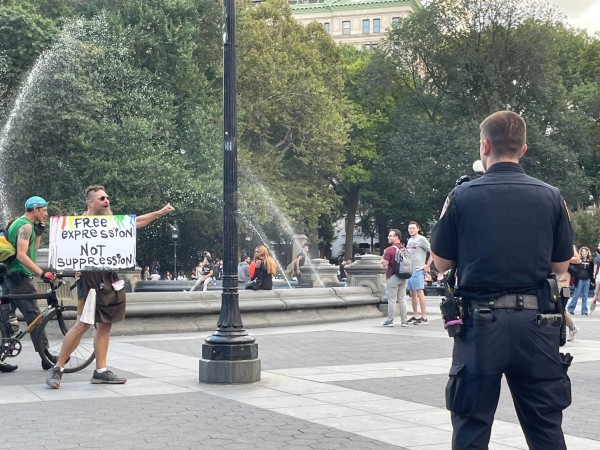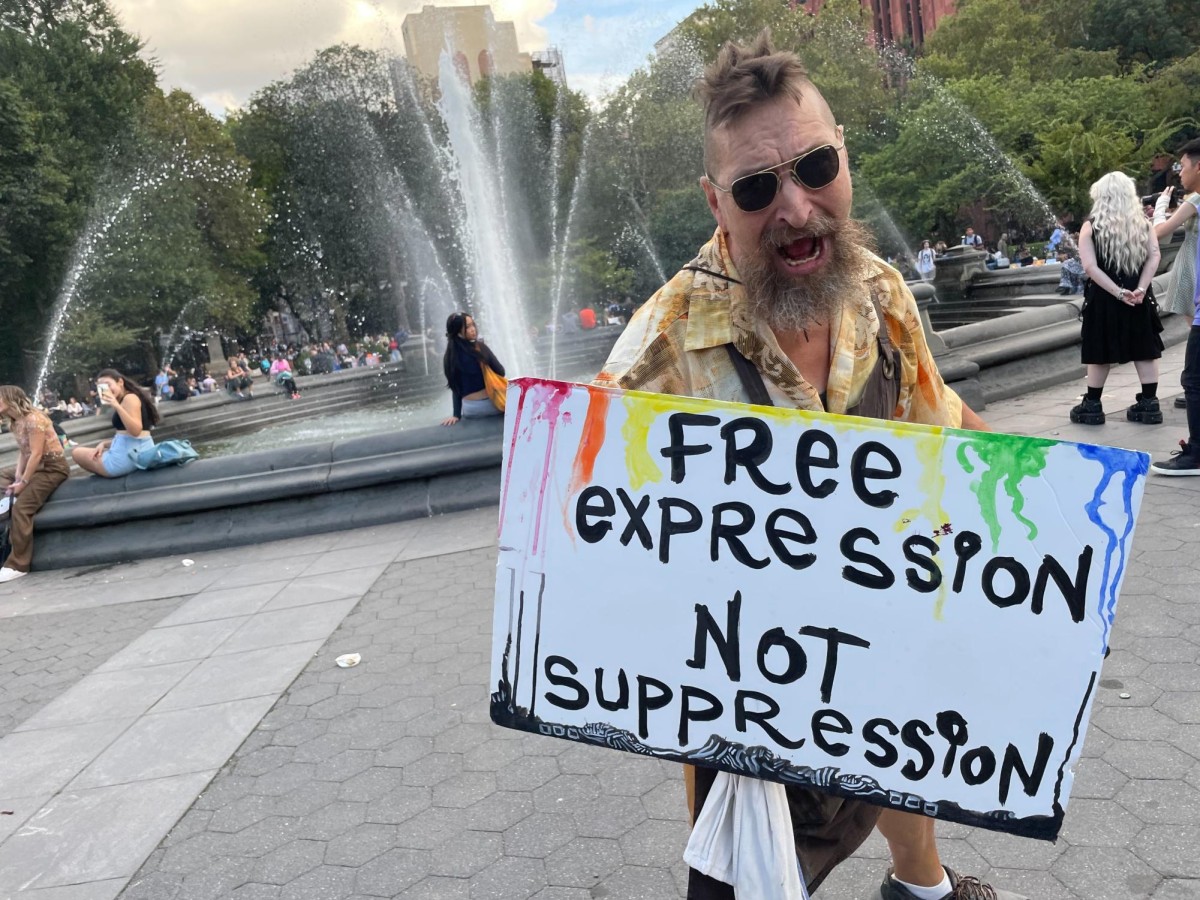Painter Eric Cook has circled the Washington Square Park fountain every Wednesday evening for the past eight weeks, holding signs and noisemakers in protest of an uptick in law enforcement and proclaiming, “we are living art!”
Cook’s weekly walk-arounds are part of an ongoing protest by several artists, vendors and buskers around Washington Square Park against what they claim is a rise in Parks Enforcement Patrol and the New York City Police Department activity. The movement began with a demonstration at the end of July, which alleged that artists faced unfair treatment and “intimidation” from law enforcement that threatened their livelihoods.
Enforcement officers have cracked down harder — mainly ticketing and forcing people to move or leave — on violations of park rules, including through the use of sound amplification devices, umbrella installation, selling items without a table and showcasing their work within 50 feet of a city monument. Cook, who has been displaying and selling his paintings in Washington Square Park since 2016, said he had little trouble with enforcement until this summer.
“I would say that before [July] 15, there was a very different way of enforcing the rules and the law, and that has very definitely changed and become quite unfair, unpredictable, random and capricious,” Cook said.
While enforcement has increased across the board, numerous artists reported it appears to be irregularly applied. Cook said the inner circle of the fountain is sometimes treated as off limits for artists and other times left alone by police. Jewelry vendor Heidi Brown reiterated Cook’s sentiments, saying her interactions with law enforcement officers have been inconsistent.
“Sometimes they look right at me and they say nothing,” Brown said. “Sometimes they look at me for 10 minutes, and then they come up to me, and they say ‘we’re gonna ticket you, and not only are we ticketing you, now we’re gonna do something else.’”

In response to these frustrations, more artists who frequent the park have joined the protests. Poet Blue Jay Walker posted a photo of himself holding a typewriter in front of the park fountain — a spot artists say is often targeted by police — to write what he says is the longest English poem of the 21st century in protest of law enforcement activity. Walker said the artists hope to raise awareness of the issue through similarly attention-grabbing stunts.
“The key to effective protest is attention,” Walker said. “‘The longest English poem’ makes people go, ‘what?’ And they say, ‘why are you writing the longest English poem, what’s it about?’ and I say it’s because we’re getting kicked out of the park. It’s been an avenue to open up conversation.”
In an effort spearheaded by Kanami Kusajima — a well-known dancer who has been featured in official city advertisements — some artists have been meeting directly with local community organizations to negotiate policy changes. In the most recent of these meetings on Sept. 13, Kusajima presented a number of proposed rule changes, such as loosening restrictions on sound amplification, allowing for structures like umbrellas and permitting artists to set up closer to monuments.
Trevor Sumner, president of the local neighborhood organization Washington Square Association, said at the meeting that the association would be open to further discussing the artists’ concerns.
“We’re open to changing regulations generally,” Sumner said. “We’re not experts or historians on the regulations themselves, so one of the things we’d like to understand is why some of these regulations are in place.”
Noticeably absent from the meeting was Will Morrison — administrator for New York City Department of Parks & Recreation and executive director of Washington Square Park Conservancy, a local nonprofit — whom Cook says he has been trying to contact for two months. The conservancy, the ranks of which include actor John Leguizamo’s wife and jewelry heiress Veronica Bulgari, has been accused of overstepping its authority in the park in the past.
In response to artists’ concerns, WSPC spokesperson Grace Harman provided a statement to WSN on Morrison’s behalf.
“The creative community is an essential part of Washington Square Park and buskers and artisans sharing their craft is a beloved tradition in this open space,” Harman wrote in the statement. “WSPC has been an active part of the ongoing dialogue with artists, buskers, elected officials, the community board and agency stakeholders as they come together to discuss a path forward to a vibrant future for the iconic open space we all cherish.”
Both Cook and Walker said they believe artists are essential to keeping the park community safe, despite being targeted by law enforcement agencies.
“In my honest opinion and experience, vendors and buskers — especially in spaces like this where there’s a community and a network of them — oftentimes do the most to keep a space safe,” Walker said. “The vendors and artists of the park are the concierges of the city; we know where the bathroom is, we know where things are, we are looking out for people, we are caring for them and guiding their experience.”
The NYPD did not respond to a request for comment.
Contact Hope Pisoni at [email protected].























































































































































